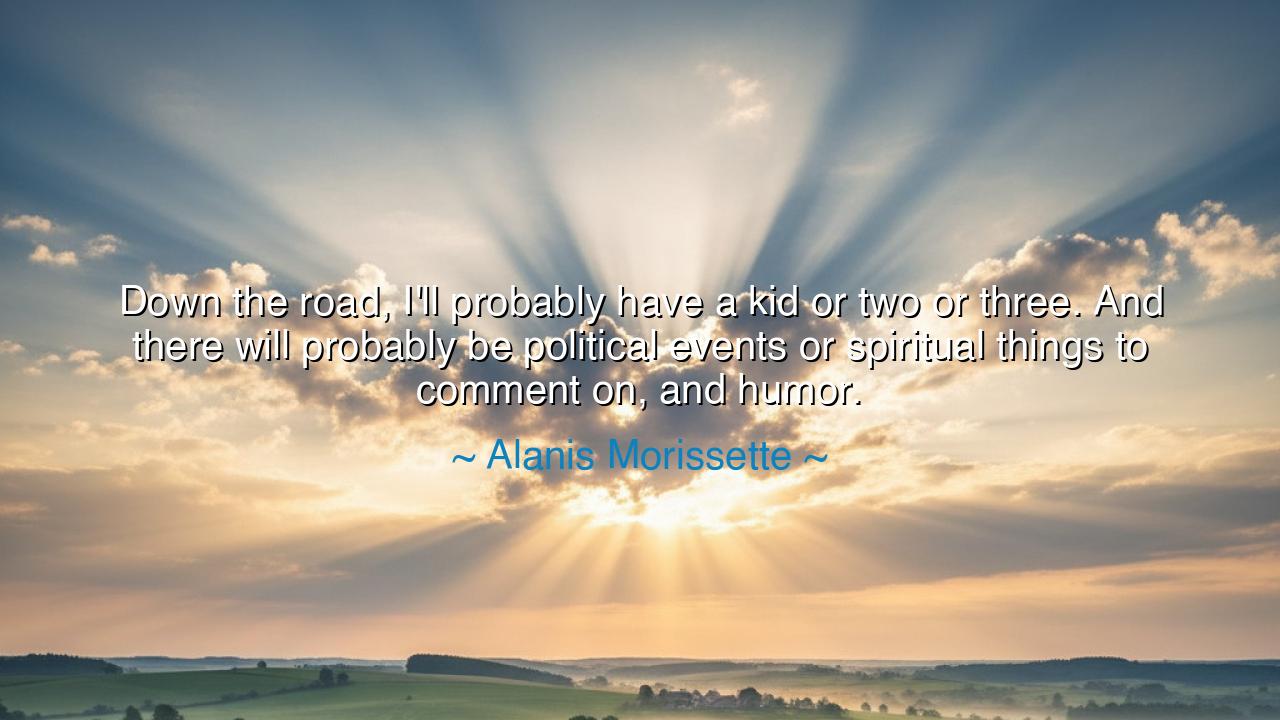
Down the road, I'll probably have a kid or two or three. And
Down the road, I'll probably have a kid or two or three. And there will probably be political events or spiritual things to comment on, and humor.






The words of Alanis Morissette—“Down the road, I’ll probably have a kid or two or three. And there will probably be political events or spiritual things to comment on, and humor”—speak not merely of a musician imagining her future, but of a soul awakening to the rhythm of life’s unfolding. Beneath their casual tone lies the quiet foresight of one who understands that the journey ahead will not be ruled by fame or ambition, but by the eternal forces that move every human being: love, faith, reflection, and laughter. Morissette’s words remind us that the path of life is not a single melody but a symphony of changing tones—each new season bringing new truths to sing.
Her quote arises from a moment of reflection in her career, a time when she had already tasted the sweetness of success and the bitterness of its isolation. Like a poet who has glimpsed the horizon beyond her own voice, she looks ahead and recognizes that the truest inspiration will not come from the stage or spotlight, but from living itself—from the simple, sacred acts of growth, motherhood, and witness to the world’s joys and sorrows. The artist’s heart, she implies, does not age into silence; it evolves into wisdom, learning to see divinity in the ordinary, and to express it with humor, humility, and grace.
Her words recall the teachings of Marcus Aurelius, the philosopher-king of Rome, who once wrote, “The universe is change; our life is what our thoughts make it.” Morissette, like Aurelius, sees life as a flowing river, not a fixed path. She acknowledges that “down the road” lies transformation—that her voice, once fierce with youth, will grow gentler, shaped by love and experience. Yet she accepts this with serenity, not fear. To her, the future is not a burden to anticipate, but a canvas upon which spirituality, humor, and human connection will paint the new chapters of her art. This is the ancient wisdom of acceptance—the knowledge that to truly live is to grow, and to grow is to evolve beyond oneself.
Consider, too, the example of Leonardo da Vinci, whose genius flowered not only in youth but through the constant renewal of his curiosity. In his later years, Leonardo turned from invention and painting to the mysteries of nature and the human soul. He, too, found that wisdom deepens as one opens to the spiritual and the human, as Morissette foretells. Just as Leonardo’s notebooks brimmed with musings on anatomy, water, and the heavens, so too does Morissette foresee her own reflections expanding beyond art into the fullness of life—children, faith, laughter, and the changing tides of the world.
When she mentions political events and spiritual things to comment on, Morissette is not merely predicting topics for her future songs; she is acknowledging that an artist’s duty is to bear witness. Every generation faces its battles—of conscience, of justice, of truth—and the artist becomes both observer and prophet. But she balances this gravity with humor, the timeless companion of wisdom. Humor, she implies, is what keeps the heart open amidst conflict. It is the same laughter that Socrates carried to his death, the same wit that Voltaire wielded to awaken reason in the dark. Through humor, the soul endures the weight of understanding without breaking.
The essence of Morissette’s message is this: life itself is art, and art must evolve with life. To live fully is to embrace the changing seasons—the sacred tenderness of parenthood, the calling of conscience in turbulent times, and the ever-deepening search for meaning. To meet each of these with honesty and laughter is to remain alive in spirit. She teaches that the artist’s journey does not end when the applause fades; rather, it transforms into the quieter, holier work of being human—of nurturing, reflecting, laughing, and speaking truth in the face of time.
So let her words be carried as a torch: Embrace the road ahead with openness, and let your creativity grow with your life. Seek the sacred in the everyday, speak truth even when it trembles, and never lose your laughter. When the world weighs heavy, let humor lighten it; when uncertainty looms, let faith steady you; when the future calls, walk toward it with courage and love. For as Alanis Morissette teaches, the artist—and indeed every soul—must learn to live as both witness and participant in life’s unfolding story, finding grace not only in creation, but in the living that makes creation possible.






AAdministratorAdministrator
Welcome, honored guests. Please leave a comment, we will respond soon